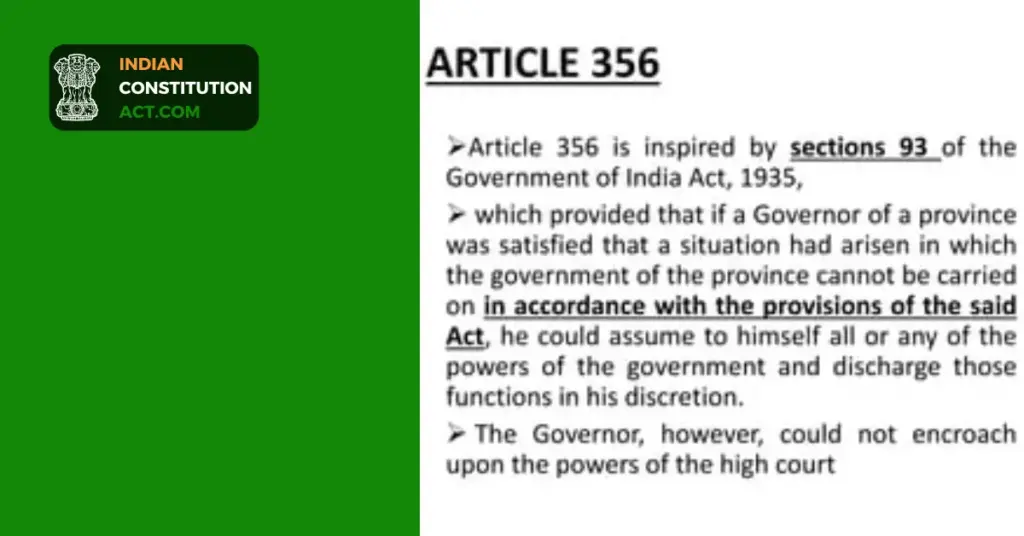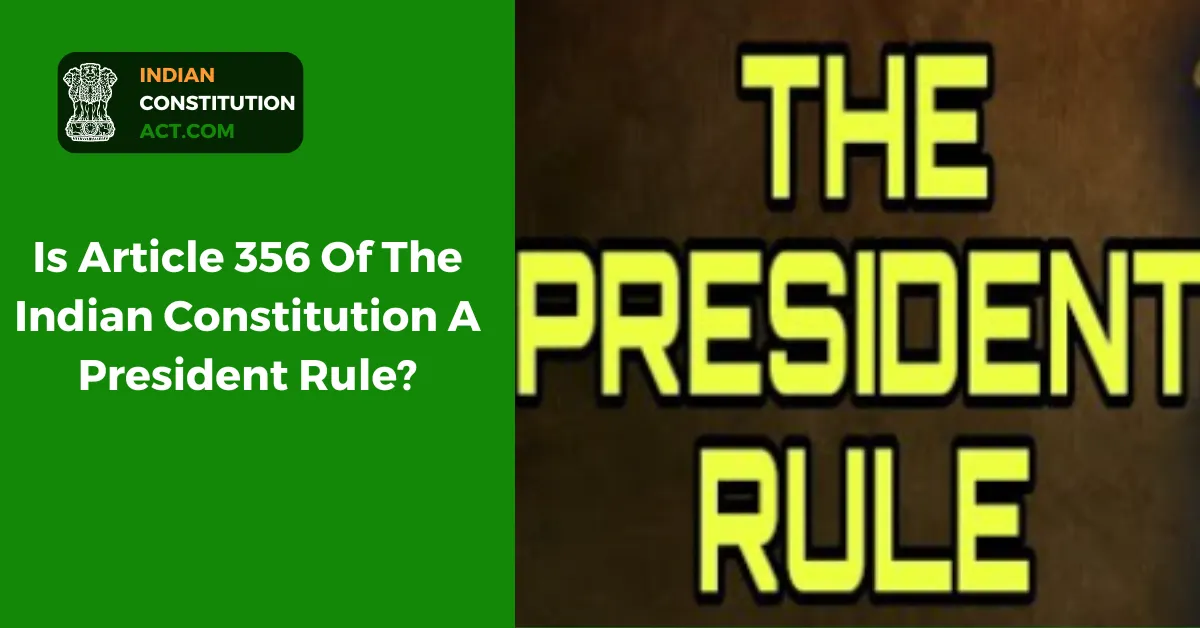Article 356 of the Indian Constitution is a president rule. It is a suspension of state government and imposition of direct Union government rule in a state. As per this article, if a state government is not able to function as per the Constitutional provisions the Union government can take direct control of the state machinery. To know everything about this article, read this blog till the last.
Table of Contents
What Is Article 356 Of The Indian Constitution? Is It A President Rule?

The Article 356 of the Indian Constitution is a provision in case of failure of constitutional machinery in states. It is a presidential rule, it is also known as a Governer rule, Constitutional Emergency, or State Emergency. But still, the Constitution of India does not use the word Emergency for this situation. It refers to a period when the constitutional machinery in a state has failed. The state government cannot function according to the provisions of the Constitution.
The President rule when the autonomy of the state government is temporarily suspended and the central governed assumes direct control of the state administration. As per this article, the imposition of the President’s rule empowers the central government to suspend the state legislature and govern the state through the governor’s office.
The centralization of the authority is intended to store the order of the constitution, to perfectly ensure the continuity of governance, and to protect the interests of the citizens when the regular State machinery is unable to function.
(1) If the President, on receipt of a report from the Governor 1 of a State or otherwise, is satisfied that a situation has arisen in which the Government of the State cannot be carried on by the provisions of this Constitution, the President may by Proclamation:
(a) Assume to himself all or any of the functions of the Government of the State and all or any of the powers vested in or exercisable by the Governor 2 or any body or authority in the State other than the Legislature of the State
(b) Declare that the powers of the Legislature of the State shall be exercisable by or under the authority of Parliament;
(c) make such incidental and consequential provisions as appear to the President to be necessary or desirable for giving effect to the objects of the Proclamation, including provisions for suspending in whole or in part the operation of any provisions of this Constitution relating to any body or authority
Provided that nothing in this clause shall authorize the President to assume to himself any of the powers vested in or exercisable by a High Court, or to suspend in whole or in part the operation of any provision of this Constitution relating to High Courts in the State:
Also read: What Is Article 368 Of The Indian Constitution?
Emergency Provisions Under Article 356 Of The Indian Constitution
(2) Any such Proclamation may be revoked or varied by a subsequent Proclamation.
(3) Every Proclamation under this article shall be laid before each House of Parliament and shall, except where it is a Proclamation revoking a previous Proclamation, cease operating at the expiration of two months unless before the expiration of that period, it has been approved by resolutions of both Houses of Parliament:
Provided that if any such Proclamation (not being a Proclamation revoking a previous Proclamation) is issued at a time when the House of the People is dissolved or the dissolution of the House of the People takes place during two months referred to in this clause, and if the Council of States has passed a resolution approving the Proclamation.
But the House of the People has passed no resolution concerning such Proclamation before the expiration of that period, the Proclamation shall cease to operate at the expiration of thirty days from the date on which the House of the People first sits after its reconstitution unless before the expiry of the said period of thirty days a resolution approving the Proclamation has been also passed by the House of the People.
(4) A Proclamation so approved shall, unless revoked, cease to operate on the expiration of a period of six months from the date of issue of the Proclamation
Provided that if and so often as a resolution approving the continuance in force of such a Proclamation is passed by both Houses of Parliament, the Proclamation shall, unless revoked, continue in force for a further period of six months from the date on which under this clause it would otherwise have ceased to operate, but no such Proclamation shall, any case, remain in force for more than three years:
Provided further that if the dissolution of the House of the People takes place during any such period of 1 six months and the Council of States has passed a resolution approving the continuance in force of such Proclamation. But the House of the People has passed no resolution concerning the continuance in force of such Proclamation during the said period. The Proclamation shall cease to operate at the expiration of thirty days from the date on which the House of the People first sits after its reconstitution unless before the expiration of the said period of thirty days a resolution approving the continuance in force of the Proclamation has been also passed by the House of the People.
Effect Of Article 356 Of The Indian Constitution On State Legislature
There are very big effects of the president’s rule on state legislature the president can either suspend or dissolve the State Legislative Assembly. The parliament passes the State Legislative bills and the state budget. As per the source, when state legislature is dissolved or suspended the parliament acquires some powers such as the parliament can delegate the power to make laws for the state to the president.
The parliament or in the case of delegation, at that time the president of India can make laws conferring powers and imposing duties on the center or its officers and authorities.
